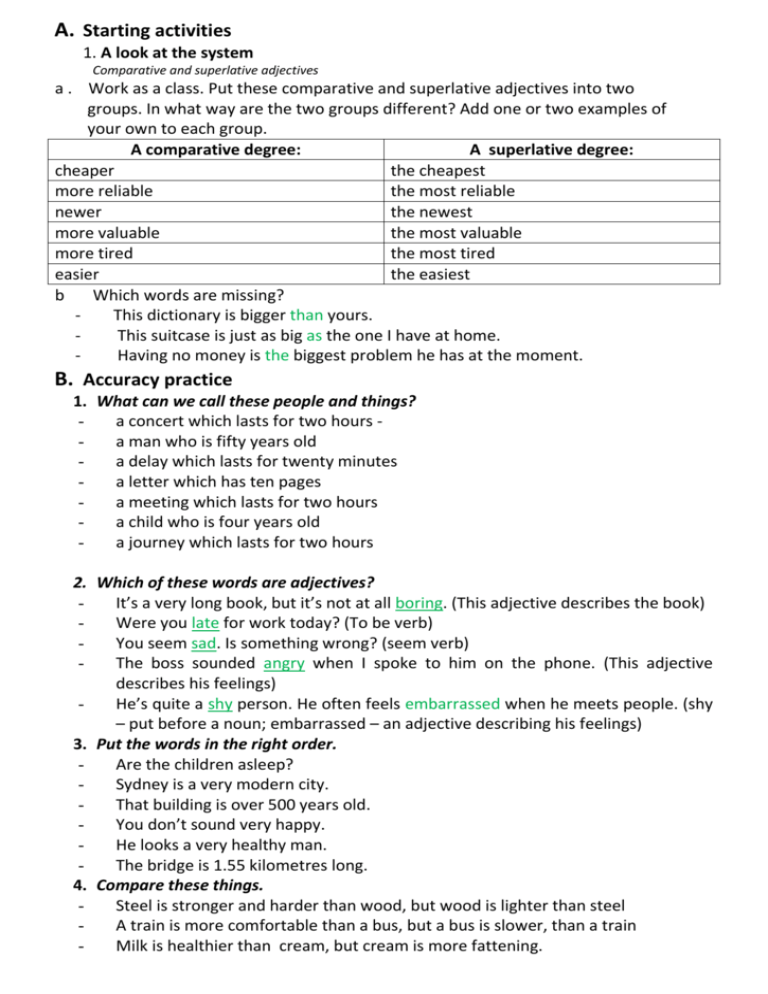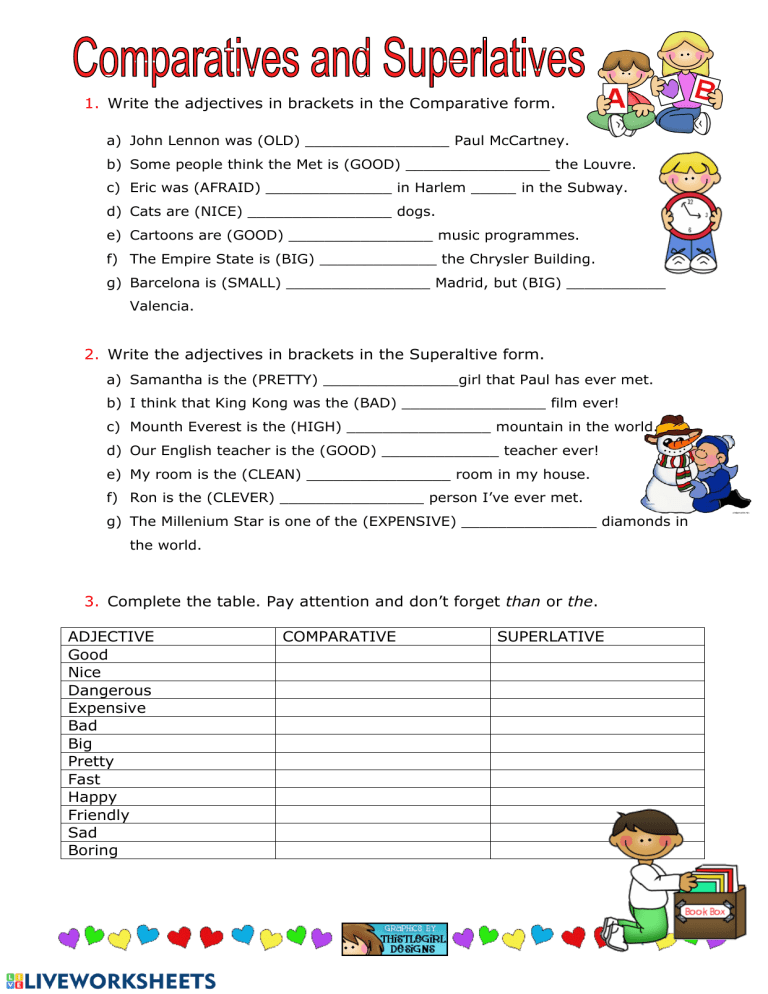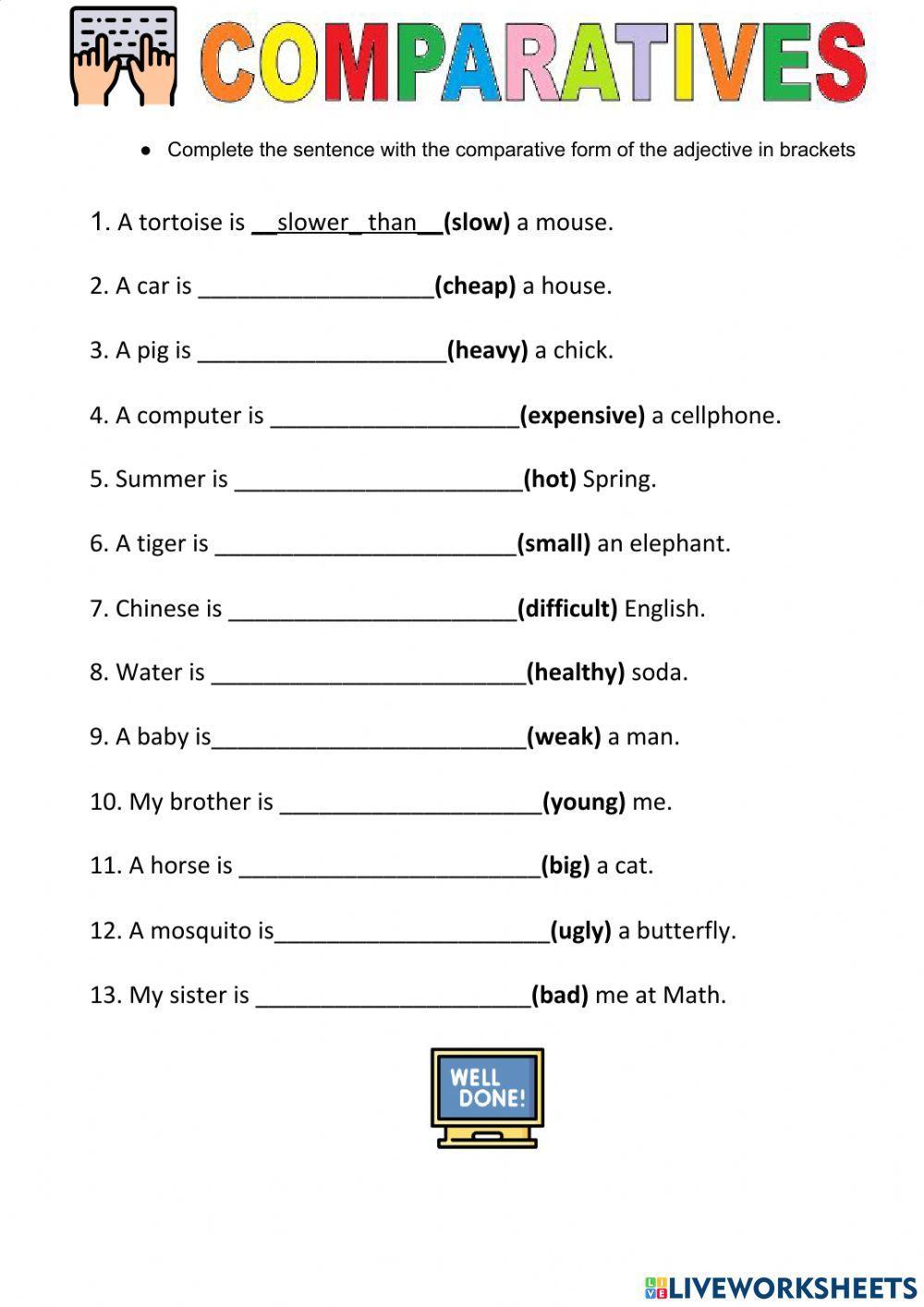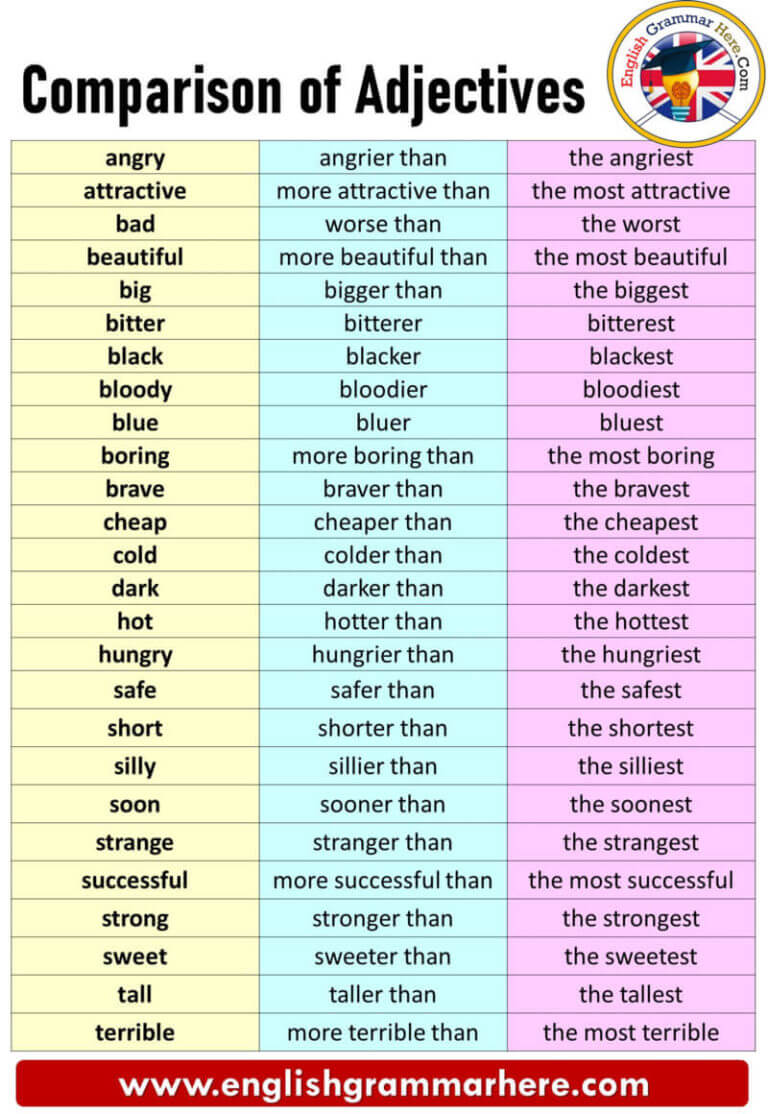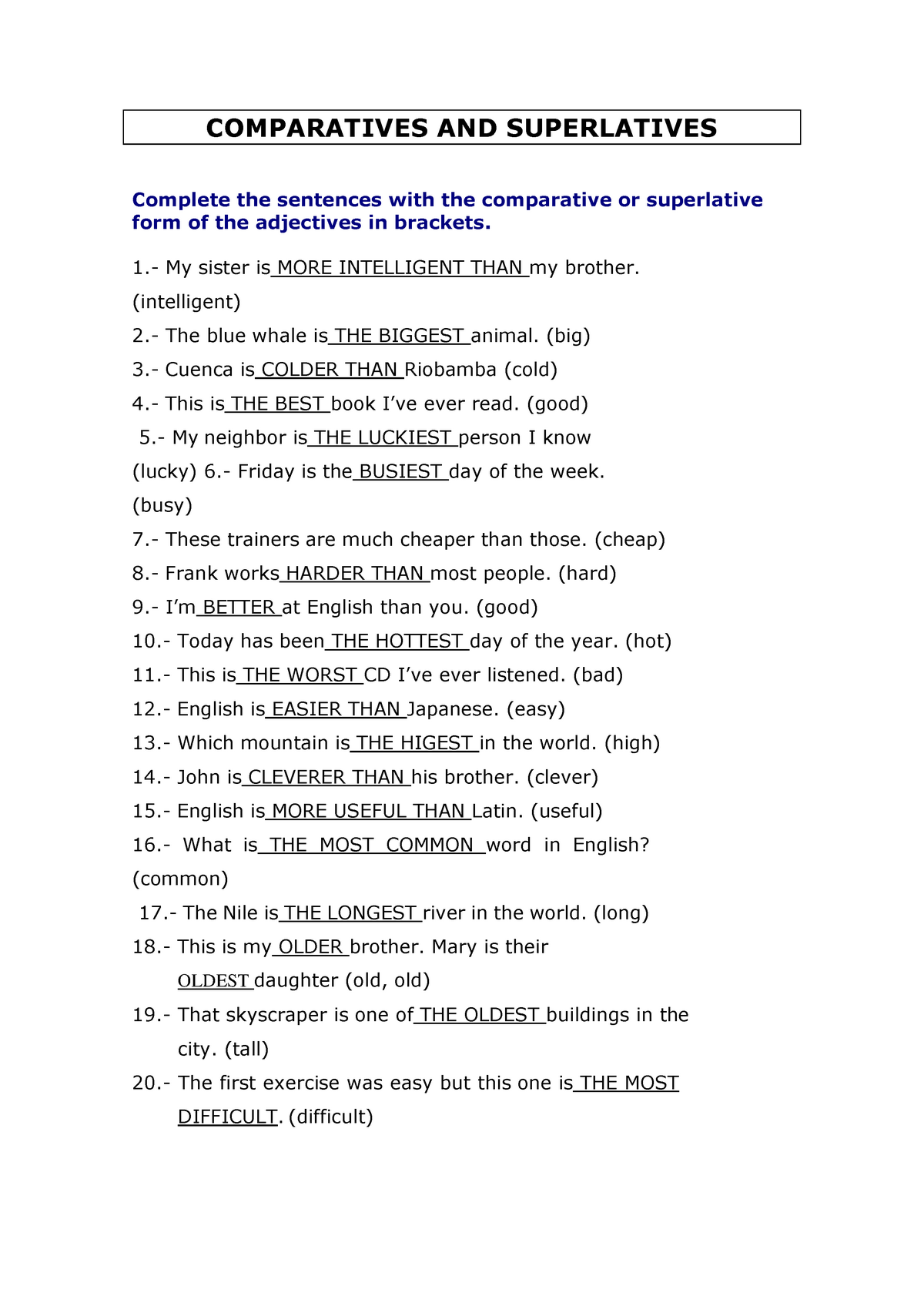Complete The Sentences With The Comparative Form Of The Adjectives
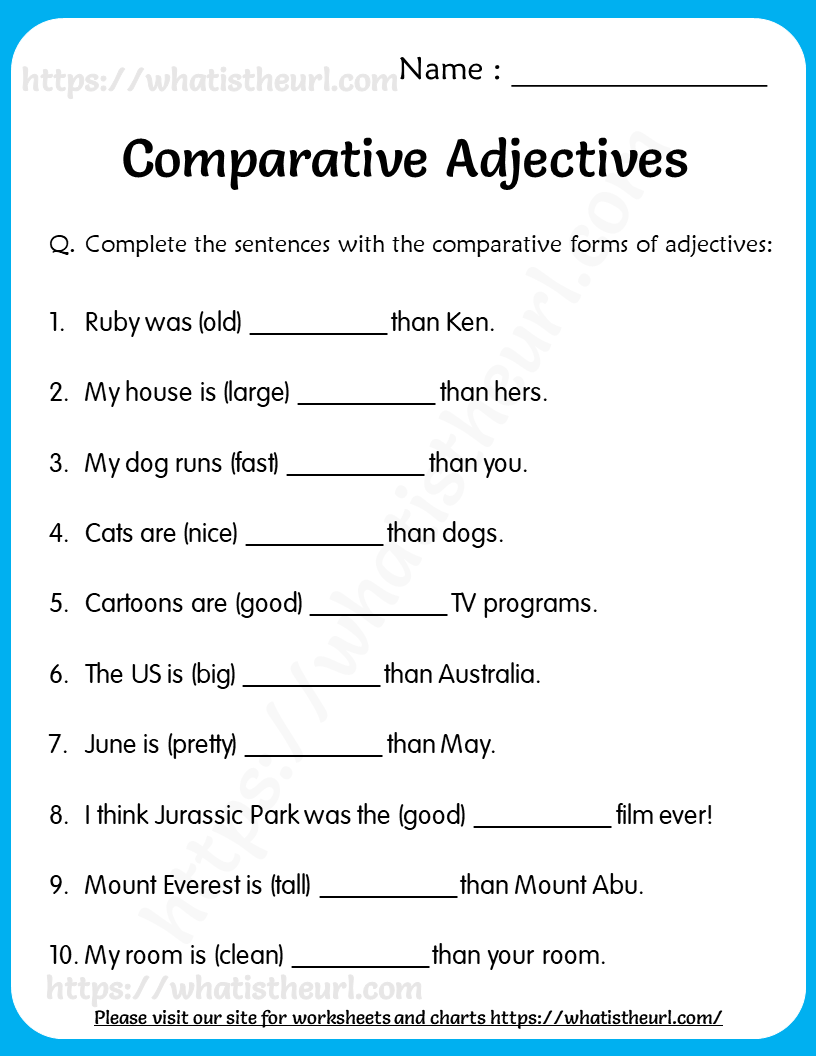
Drodzy uczniowie,
przygotowałem dla Was obszerne omówienie zagadnienia uzupełniania zdań formami stopnia wyższego przymiotników. Mam nadzieję, że ten materiał rozwieje wszelkie Wasze wątpliwości.
Zacznijmy od kilku przykładów, które pokażą, jak działa ten mechanizm:
- This car is (fast) _______ than that one. -> This car is faster than that one.
- My house is (big) _______ than yours. -> My house is bigger than yours.
- The weather today is (cold) _______ than yesterday. -> The weather today is colder than yesterday.
- She is (tall) _______ than her brother. -> She is taller than her brother.
- This book is (interesting) _______ than the film. -> This book is more interesting than the film.
- Math is (difficult) _______ than English. -> Math is more difficult than English.
- Living in the city is (expensive) _______ than living in the countryside. -> Living in the city is more expensive than living in the countryside.
- Health is (important) _______ than money. -> Health is more important than money.
- This exercise is (easy) _______ than the last one. -> This exercise is easier than the last one.
- He is (happy) _______ now than he was yesterday. -> He is happier now than he was yesterday.
Przejdźmy teraz do analizy przymiotników nieregularnych. Należy je znać na pamięć.
- Good -> Better: This apple pie is (good) _______ than the one I made last week. -> This apple pie is better than the one I made last week.
- Bad -> Worse: The weather today is (bad) _______ than yesterday. -> The weather today is worse than yesterday.
- Far -> Further/Farther: My house is (far) _______ from the school than yours. -> My house is farther/further from the school than yours. (Formy "farther" i "further" są poprawne, ale "further" częściej używa się w sensie metaforycznym, np. "further investigation").
- Little -> Less: I have (little) _______ money than you. -> I have less money than you.
- Much/Many -> More: I have (much) _______ free time than I used to. -> I have more free time than I used to.
Zwróćmy uwagę na sytuacje, gdzie podwajamy ostatnią spółgłoskę w przymiotniku:
- Big -> Bigger: My dog is (big) _______ than your cat. -> My dog is bigger than your cat.
- Hot -> Hotter: Today is (hot) _______ than yesterday. -> Today is hotter than yesterday.
- Fat -> Fatter: He is getting (fat) _______ every year. -> He is getting fatter every year.
- Sad -> Sadder: He is (sad) _______ today than he was yesterday. -> He is sadder today than he was yesterday.
- Thin -> Thinner: She is (thin) _______ now than she was last year. -> She is thinner now than she was last year.
Oto kilka przykładów użycia "more" przed przymiotnikiem:
- He is (careful) _______ than his brother. -> He is more careful than his brother.
- This problem is (complicated) _______ than it seems. -> This problem is more complicated than it seems.
- The situation is (serious) _______ than we thought. -> The situation is more serious than we thought.
- She is (intelligent) _______ than her sister. -> She is more intelligent than her sister.
- This solution is (practical) _______ than the other one. -> This solution is more practical than the other one.
- He is (successful) _______ now than he was ten years ago. -> He is more successful now than he was ten years ago.
- This task is (difficult) _______ than the previous one. -> This task is more difficult than the previous one.
- Her explanation was (convincing) _______ than his. -> Her explanation was more convincing than his.
- This method is (effective) _______ than the old one. -> This method is more effective than the old one.
- His arguments were (persuasive) _______ than hers. -> His arguments were more persuasive than hers.
A teraz przykłady z przymiotnikami zakończonymi na -y, gdzie zamieniamy "y" na "i":
- Happy -> Happier: She is (happy) _______ now than she was before. -> She is happier now than she was before.
- Easy -> Easier: This exercise is (easy) _______ than the last one. -> This exercise is easier than the last one.
- Busy -> Busier: He is (busy) _______ this week than he was last week. -> He is busier this week than he was last week.
- Funny -> Funnier: This movie is (funny) _______ than the one we watched last night. -> This movie is funnier than the one we watched last night.
- Pretty -> Prettier: She is (pretty) _______ than her sister. -> She is prettier than her sister.
Stopień Wyższy z Użyciem "Less"
Warto również pamiętać o tworzeniu stopnia wyższego przez użycie słowa "less", które oznacza "mniej". Stosujemy go, gdy chcemy powiedzieć, że coś jest "mniej" jakieś cechy niż coś innego.
- This car is (expensive) _______ than that one. -> This car is less expensive than that one.
- He is (successful) _______ than his brother. -> He is less successful than his brother.
- This movie is (interesting) _______ than I expected. -> This movie is less interesting than I expected.
- Living in the city is (stressful) _______ than living in the countryside. -> Living in the city is less stressful than living in the countryside.
- This task is (difficult) _______ than the previous one. -> This task is less difficult than the previous one.
- She is (happy) _______ now than she was before. -> She is less happy now than she was before.
- This book is (complicated) _______ than the other one. -> This book is less complicated than the other one.
- He is (careful) _______ than his friend. -> He is less careful than his friend.
- This solution is (practical) _______ than the first one. -> This solution is less practical than the first one.
- Her arguments were (persuasive) _______ than his. -> Her arguments were less persuasive than his.
Użycie "As...As" w Porównaniach
Czasami zamiast stopnia wyższego chcemy powiedzieć, że coś jest tak samo jakieś cechy, jak coś innego. Wtedy używamy konstrukcji "as...as".
- This car is (expensive) _______ as that one. -> This car is as expensive as that one.
- He is (successful) _______ as his brother. -> He is as successful as his brother.
- This movie is (interesting) _______ as I expected. -> This movie is as interesting as I expected.
- Living in the city is (stressful) _______ as living in the countryside. -> Living in the city is as stressful as living in the countryside. (W tym przypadku można by rozważyć użycie stopnia wyższego, w zależności od tego, co chcemy podkreślić).
- This task is (difficult) _______ as the previous one. -> This task is as difficult as the previous one.
- She is (happy) _______ as she was before. -> She is as happy as she was before.
- This book is (complicated) _______ as the other one. -> This book is as complicated as the other one.
- He is (careful) _______ as his friend. -> He is as careful as his friend.
- This solution is (practical) _______ as the first one. -> This solution is as practical as the first one.
- Her arguments were (persuasive) _______ as his. -> Her arguments were as persuasive as his.
Jeszcze Więcej Przykładów
Dla utrwalenia wiedzy, proponuję jeszcze kilka przykładów:
- The blue dress is (beautiful) _______ than the red one. -> The blue dress is more beautiful than the red one.
- My phone is (new) _______ than yours. -> My phone is newer than yours.
- This coffee is (strong) _______ than the one I usually drink. -> This coffee is stronger than the one I usually drink.
- The book is (long) _______ than the movie. -> The book is longer than the movie.
- This summer is (hot) _______ than last summer. -> This summer is hotter than last summer.
- The exam was (difficult) _______ than I expected. -> The exam was more difficult than I expected. or The exam was less difficult than I expected (w zależności od znaczenia).
- She is (patient) _______ than her husband. -> She is more patient than her husband.
- This car is (reliable) _______ than the old one. -> This car is more reliable than the old one.
- Learning English is (easy) _______ than learning Chinese. -> Learning English is easier than learning Chinese.
- He is (generous) _______ than I thought. -> He is more generous than I thought.
Pamiętajcie, że kluczem do sukcesu jest regularne ćwiczenie i zapamiętywanie wyjątków. Powodzenia!
